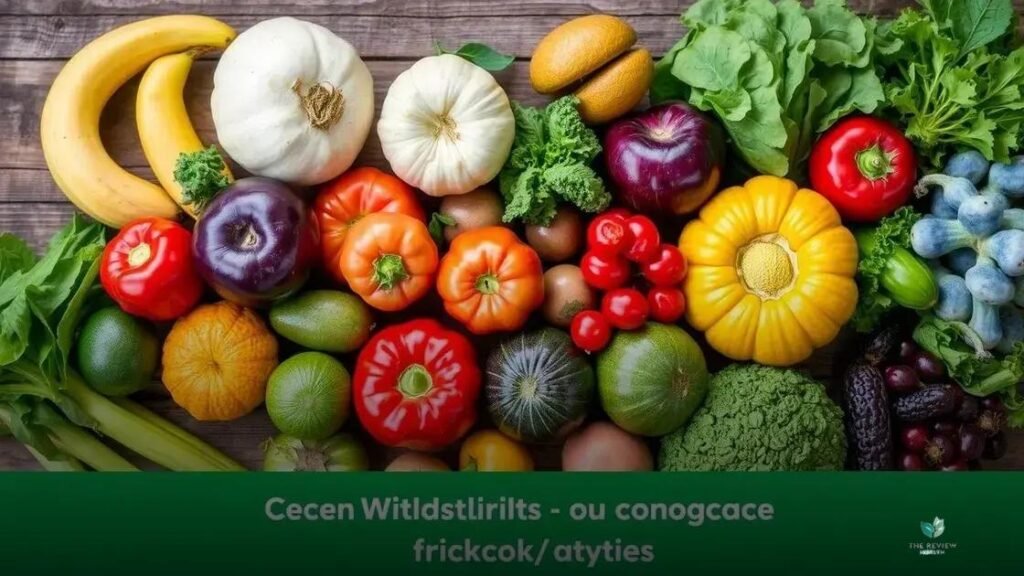Sustainable foods are those produced and consumed with minimal environmental impact, promoting social equity and long-term economic viability, encompassing practices from farm to fork that prioritize resource conservation and fair labor.
When you think about your meals, have you ever considered the impact of sustainable foods? By making conscious choices, you can nurture your health and the planet. Let’s dive into what sustainable foods are and how they play a crucial role in our lives.
What are sustainable foods and why they matter?

Sustainable foods are those produced and consumed in a way that minimizes negative environmental impact, supports social equity, and contributes to long-term economic viability. This approach considers the entire lifecycle of food, from farm to fork, focusing on reducing waste, conserving resources, and promoting fair labor practices.
Why Sustainable Foods Matter
Choosing sustainable foods goes beyond personal health; it’s an investment in a healthier planet. Our current food systems contribute significantly to greenhouse gas emissions, deforestation, and water pollution. By shifting towards sustainable practices, we can mitigate these effects and protect vital ecosystems.
Sustainable agriculture practices, such as reducing pesticide use and promoting biodiversity, are crucial for soil health and water conservation. These methods help maintain fertile land for future generations and protect our water resources from contamination.
Moreover, supporting local and sustainable food systems strengthens communities by creating economic opportunities and providing access to fresh, nutritious food. This approach fosters a more resilient and equitable food system that benefits both producers and consumers.
By prioritizing sustainable foods, we can contribute to a healthier planet and a more secure food future for all.
Top benefits of incorporating sustainable foods into your diet

Incorporating sustainable foods into your diet offers a wealth of benefits for both your health and the environment.
Improved Health
Sustainable foods often prioritize fresh, whole, and unprocessed options, which are naturally rich in vitamins, minerals, and antioxidants. These nutrient-dense foods can boost your immune system, reduce your risk of chronic diseases, and improve your overall well-being.
Reduced Environmental Impact
By choosing sustainably produced foods, you’re supporting farming practices that minimize harm to the environment. This includes reducing greenhouse gas emissions, conserving water, and protecting biodiversity. Eating locally sourced food also reduces transportation distances, further lowering your carbon footprint.
Support for Local Communities
Buying sustainable foods often means supporting local farmers and businesses. This strengthens local economies, creates jobs, and fosters a greater sense of community. It also gives you access to fresher, seasonal produce.
Enhanced Food Security
Sustainable food systems are more resilient in the face of challenges like climate change and economic instability. By supporting these systems, you contribute to a more secure and stable food supply for everyone.
By making conscious choices about the food you eat, you can improve your health, protect the planet, and build stronger communities.
Easy tips for choosing sustainable foods at the store

Making sustainable food choices at the store doesn’t have to be complicated. Here are some easy tips to help you navigate the grocery aisles:
Check for Certifications
Look for certifications like organic, fair trade, and Marine Stewardship Council (MSC) for seafood. These labels indicate that the food has been produced according to specific sustainability standards.
Buy Local and Seasonal
Choosing locally grown, seasonal produce reduces transportation distances and supports local farmers. Check for farmers’ markets in your area or look for locally sourced options in the grocery store.
Reduce Packaging
Choose products with minimal packaging or opt for reusable containers. Buying in bulk can also help reduce packaging waste.
Read Labels Carefully
Pay attention to ingredients and where the food comes from. Look for products made with sustainably sourced ingredients and avoid those with excessive processing or additives.
Plan Your Meals
Planning your meals ahead of time can help you avoid impulse purchases and reduce food waste. Make a shopping list based on your meal plan and stick to it.
Consider Imperfect Produce
Many stores now offer “imperfect” fruits and vegetables at a discounted price. These items may have cosmetic blemishes but are perfectly good to eat and help reduce food waste.
By following these simple tips, you can easily incorporate more sustainable foods into your diet and contribute to a healthier planet.
Making a Difference with Sustainable Food Choices
Choosing sustainable foods is more than just a trend; it’s a powerful way to contribute to a healthier planet and a better future. By making conscious decisions about the food we buy, eat, and dispose of, we can collectively reduce our environmental impact and support a more equitable and resilient food system. Start small, make gradual changes, and enjoy the benefits of knowing your food choices are making a positive difference.
FAQ: Your Questions About Sustainable Foods Answered
What are sustainable foods?
Sustainable foods are produced and consumed in ways that minimize environmental impact, promote social equity, and support economic viability.
Why should I choose sustainable foods?
Choosing sustainable foods benefits your health, protects the environment, supports local communities, and contributes to a more secure food system.
How can I identify sustainable foods at the grocery store?
Look for certifications like organic, fair trade, and MSC (for seafood). Choose locally sourced and seasonal produce, and opt for products with minimal packaging.
Is eating sustainably expensive?
Not necessarily. Planning meals, reducing food waste, and buying in bulk can help you save money while eating sustainably. Farmers’ markets can also offer affordable seasonal produce.
What are some easy ways to incorporate sustainable foods into my diet?
Start by making small changes, like swapping out one conventional item for a sustainable alternative. Gradually increase your consumption of plant-based proteins, choose local and seasonal fruits and vegetables, and reduce your meat intake.
How can I reduce food waste?
Plan your meals, store food properly, use leftovers creatively, and compost food scraps.

Sarah Thompson is a passionate advocate for healthy living and mindful lifestyle choices. With a background in nutrition science and years of experience as a wellness coach, Sarah dedicates her time to exploring the latest trends, research, and products that promote physical, mental, and emotional well-being.
As the lead writer for The Review Health , Sarah combines her expertise with a genuine love for helping others make informed decisions about their health. Her articles are designed to inspire and educate, offering practical tips, honest reviews, and science-backed insights to support readers on their journey to a healthier, happier life.
When she’s not writing or researching, Sarah enjoys yoga, experimenting with plant-based recipes, and spending time outdoors with her family.



